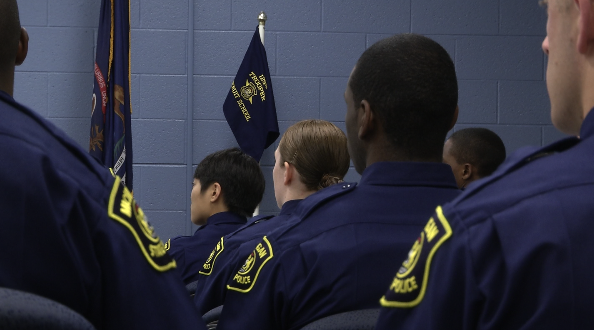From Week 4 to Week 22: Michigan State Police Trooper Recruit School is a Mental Challenge
- Published: 7/13/2016
- Comments
LANSING - It’s making a conscious choice to come back week after week.
It’s wanting to become a state trooper, and not just doing it.
“We know what we’re coming back to once we get on in the weeks, and it’s making that choice to come back and continue to do what we need to do to be state troopers,” 129th Trooper Recruit School recruit Gordon Sandula said.
As the days go by in the 22-week long program, recruits know that while it gets easier as they improve, it gets harder mentally.
“This whole academy is a mental challenge,” recruit Dijon Ware said.
Their routines are still the same as they were in the beginning.
The recruits wake up and have physical training at 5 a.m., followed by a quick break to shower, then breakfast.
After breakfast they have more physical or academic classes, then lunch, then another four hours of either one.
Dinner is at 5 p.m., then comes a five-hour block for their respective duties of the week (dishes, cleanup, etc.) and studying.
Lights out happen at 10 p.m. every night.
But the recruits remember one particular night when they went to bed much later and were tasked with solving a pretend call, simulating that even in the last few minutes of a 10- or 12-hour work shift, they might have to answer to a situation that can take an additional six hours or more.
What keeps them motivated?
To Ware, it’s the words he reads every morning with his group.
“Before PT every morning, we read the sign above the ramp (by the gym) that says, ‘if you think you can, you will, if you think you can’t, you’re right,’” he said.
To others recruits, pressuring words from a trainer during defensive tactics or physical training classes can do the trick.
“If you quit in here or put your feet down, put your shoulders down, quit on a pushup, quit in the classroom, what’s going to happen when you’re fighting for your life?” the defensive tactics trainer said back in week four.
The 129th Michigan State Police Trooper Recruit School is reaching its final hours, and the recruits are ready to serve the citizens of Michigan.
As the recruits become more prepared, so do their mentors in the academy.
“(The recruits) begin to let their hair down a little bit,” Michigan
Trooper and academy mentor Tedric Gibbs said. “We definitely want to see who they are as a person, not just a recruit, because they will be partners of ours.”
What once was a strictly training relationship, now becomes a partnership of a family environment.
“They’re looking at you as not a recruit, not someone they’re training, but as a future partner, a future family member of this wonderful organization,” recruit Megan Symonds said.”
In the classroom, a long-time trooper could be heard saying, “don’t think you’ll have to wait 24 years, like this guy did,” as he explains the time he was shot three times, one being on his rib below his heart.
The recruits that make it through the program – not all people who start stay through the entire 22 weeks –, learn that the training doesn’t sugarcoat the real-world experiences.
The teachers, trainers and mentors they have while in the academy, said they try to make their experience as real as possible.
This is what makes the recruits realize that there’s only one way to survive: don’t quit.
“You want to say I can’t do it anymore, you want to throw in the towel,” Symonds said. “And then you look to either side of you and you see the staff that really wants to see you succeed, and you find that extra mile.”
As they realized that they can’t quit, this class of recruits has achieved a long list of accomplishments, including a combined loss of 210 lbs., with one recruit losing 29 lbs.
“We’re troopers,” Ware said. “We come out, we go home at the end of the day. We’re the ones coming out of the ditch. That’s the kind of mindset you have to have.”
Like the guest speaker in the classroom said, it was the training that helped him shoot his aggressor, after trying other possible solutions, and it was his partner who saved his life by forcing him to go to the hospital.
“It’s important for each recruit to continue training,” Gibbs said.
“Maybe not in the same intensity as here at the academy, but hopefully we put them in the position where they will still continue to want to work out, want to maintain their physical fitness. As police officers, as troopers, it’s vital for our jobs.”
Aside from the list of physical and academic accomplishments, their biggest one would be in 48 hours, when they cross the stage at graduation and receive the Michigan State Police badge.
“There’s really no other way to say it, I’m excited. I’m honored that I’ve been walking through these halls,” Sandula said. “I’m going to be honored to be walking down with all of the other recruits who are going to become troopers that day.”
While they have learned that not quitting is the only way to get through the academy, the recruits have advice for people who might want to go through the same 22 weeks they did.
“It’s a great organization, but you don’t know it at all, and it’s going to change you,” Symonds said.
After graduation, they will proceed to another phase.
On Monday right after graduation, they will report to their precinct and start going out as troopers, but for the first few week, they will be with their Field Training Officer.
“The program only accelerates from here,” Ware said. “Just because we’re done with the academy, it’s pretty much another phase we have to get through.”


 Spanish
Spanish Chinese (Simplified)
Chinese (Simplified) Korean
Korean French
French German
German Hindi
Hindi Urdu
Urdu Japenese
Japenese Arabic
Arabic Russian
Russian Farsi
Farsi
